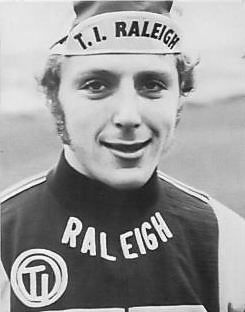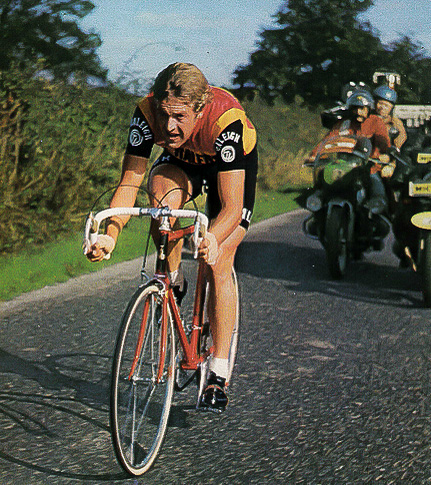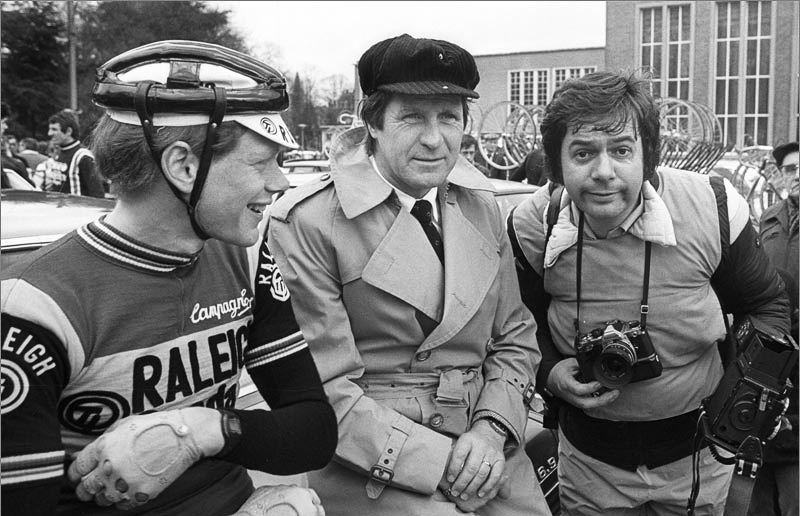
Four decades have passed and it’s still debated; 70’s Team Raleigh – was their legendary manager, the late Peter Post anti-British or anti-failure ?
It was Billy Bilsland a few years ago who put it to me that it was the latter; not a matter of where your passport was issued.
But in a recent interview with Kenny Pryde in Rouleur magazine Billy states that Post was ‘anti’ the British riders.
There’s little doubt that Post was an uncompromising character, even those with immense respect for him will concede that he could be a difficult man – as one of his loyalist lieutenants, Theo de Rooij told us in a recent interview.
Dave Lloyd, who rode for Post is vocal in his criticism, saying that the Dutchman ruined his career.
And Bill Nickson is another who rode for the big man from Amsterdam in that famous red, yellow and black jersey but was never a card carrying PP Fan Club member.
We decided to speak to a man who most will have forgotten rode for the mighty and still revered team which rode beautiful bicycles made with pride and precision in Nottingham – not churned out of moulds in the Far East.
Bob Chadwick is the man; a talented junior he went straight from a short but successful amateur career in the UK to riding in the service of the likes of Dietrich Thurau and Roy Schuiten with Post at the helm.
Here’s what he had to say to VeloVeritas, recently:
You were second to Steve Heffernan in the 1970 BCF Junior Road Race Championship, Bob?
“Yes, I was a handy junior back then, I was pretty quick in a ’25’ too, with 54:14. I hadn’t come across ‘Heff’ he was from London and I was from Stoke so he was a bit of an unknown quantity. It was held on the Willaston Circuit on the Isle of Man over 17 laps with a climb every lap.
“There were three of us away, Heff, a local guy and me – I hammered the climb every lap but I just couldn’t get rid of Heff. I knew Heff was a hell of a sprinter but I actually thought I’d got it in the uphill sprint to the line – but he got round me in the last 20 yards.
“I was going well that year; as well as the quick ’25’ I’d won a big junior international race in Brunswick, Germany.
“But it was different back then, you rode everything, road, time trials and track – I used to against the seniors at the old Newcastle-Under-Lyme track.
“Les West and Brian Rourke would ride, knocking out the ten mile in 20 minutes – which was quick for that track, it was like riding round a field!”
How about your amateur palmares, Bob?
“I rode the Milk Race for the GB Regions team in 1971 and I won the Viking Trophy on the Isle of Man. That was two laps of the TT circuit; 75 miles.
“I broke away on the first lap and when I got the bell it wasn’t like there was one lap of a criterium to go – it was 37 miles.
“I remember thinking; ‘what the hell am I doing ?’ But I went into TT mode, stayed away and set a record for the race.
“I used to ride the Star Trophy races like the Tour of the Peak and Tour of Furness – there were a lot more high level races in the UK back then and strong fields.
“Merseyside was really strong, you’d turn up at a big race and there would be 15 guys each from the Kirkby and Mercury; and those boys gave you no leeway – we were all deadly enemies. Albeit we laugh about it now when we have our reunions.
“There were some really classy guys around – Kevin Apter was one but like Les West he was put off from going abroad because there was so much doping going on.
“But it was a different era, I used to on 100 mile plus runs to Llangollen with Brian Rourke and Les West when I was 14 years-old and think it was normal.
“That would classify as child abuse, these days!”
How did the Raleigh ride come about?
“I only rode senior for a couple of years but I made the Olympic squad. Although I knew I wasn’t going to go, not with riders like Dave Lloyd, John Clewarth and Phil Griffiths on the squad.
“But no one wanted to turn pro in Olympic year and George Shaw at Raleigh was looking for riders; the team was just kicking in.
“Brian Rourke said that I shouldn’t make the same mistake that Les West made and wait for four years to ride the next Olympics only to puncture early in the day.
“So I decided to turn pro – but it was a big decision back then.
“Now, Cav can ride the Commonwealth Games and Olympics but back then it was strictly amateurs only and if you wanted reinstated as an amateur there was a two year waiting period to get your amateur licence back.
“But Brian Rourke said that the sooner I started to climb the ladder and serve my apprenticeship as a pro, the better and for 1973 I was pro with Raleigh.”

That was one stellar line up at Raleigh.
“Yes, the likes of Didi Thurau, the late Roy Schuiten, Rene Pijnen, Tino Tabak – who became a really good friend of mine. The plan was that I was on the British team and there would be excursions abroad.
“The British programme really didn’t suit me though – all those city centre crits.
“I was too light for them, sitting in the line for an hour and not being able to move up isn’t actually racing in my book so I approached Peter Post and explained that to him.
“I always found him to be a fair man and whilst I was too light for the cobbled Classics he’d put me in races like Paris-Bourges, tough races but more suited to my characteristics.
“It was hard to be competitive because there was so much kitting up going on – there was the smell of it in the air and you saw stuff, tablets, syringes – but I did have my moments, ‘every dog has his day.’
“I think that some of the British riders came across a little bit prima donna-ish because they didn’t realise that the Post had big established stars and their job was to serve those riders.
“Some of the British guys thought that they were there to win races and that’s where they went wrong, you were there to fit in and do a job.”
Where were you based when you rode over there?
“I’d race at home then there would be a block of racing over there when Peter Post wanted us.
“I stayed at Mrs. Deene’s cyclists’ guest house (along with Vik and our own Martin) and also at Tino’s place – there were no flash hotels for you back then, even though you were part of cycling’s first ‘super team.’
“You know, they say that Super Mario Cipollini was the guy who pioneered the sprint train – but at Raleigh we had something very similar organised and I had a part in it.
“My job was to drill it between five and three kilometres to go, keep it lined out and prevent attacks from going – I’d pull off at three to go, totally wasted and drift in minutes down.
“But at the finish Post would be there to shake your hand and tell you; ‘well done’ – it was about doing the job with him -that was the point of your being there.”
You got on with Post, then?
“I found him to be a fair guy and I wouldn’t say he was anti-British; I think he felt that some of the Brits were selfish, over there to be number one and ride for themselves.
“But he had a go at everyone if he wasn’t happy with them, not just the British riders.
“I knew what my job was and I knew that if I got on with Post then you’d get on with everyone, you had to fit in – if your face doesn’t fit it makes life hard …
“Like I say, he wanted results – there were no race radios back then and as well as having to go back to the car with jerseys and to fetch bottles part of the job was to relay instructions and unfortunately sometimes our interpretation of how the race was developing was different from his!
“There’s no doubt that Dave Lloyd and Bill Nickson had great potential; but in the same breath Post had proven continental stars who could win races for him …”

Did any of the established riders take you under their wing?
“I got on well with most of the guys, Billy Bilsland, Tino Tabak and the big stars like Rene Pijnen and Didi Thurau were all approachable guys – we’d sit and chat just like we are now.”
Just one season with Raleigh?
“What happened was that whilst me and a couple of the other British guys were still contracted to Raleigh for ’74 they were building the Euro team and we were given rides under the name of Raleigh subsidiary companies in the UK.
“I rode for Brian Rourke-Brooks Saddles, with Brooks being part of Raleigh.”
Wasn’t it hard on the head coming back to UK racing after the buzz of the continent?
“Yeah, it was always going to be hard to get back over there once you came back to the UK – I felt that all the progress I had made had been undone. The scene wasn’t great and there were a lot of guys just riding for a bike and a jersey – and the city centre races just didn’t suit me.
“The GB pros were real specialists at that type of racing; some of the top Euro guys would come over but couldn’t win because the British guys were so good at those crits.
“Geoff Wiles had a special crit bike with a high bottom bracket and 165 mm cranks so he could pedal round the corners.
“And there were fast guys off the track like Tony Gowland and Reg Barnett to contend with. I’d sit there in the line unable to move up – it used to do my head in!
“There were some races on the calendar which suited me – they ran a professional Tour of the Peak and I rode well in that; I was away on my own and caught by Les West in the last 10 miles I couldn’t hold him but still finished eighth which wasn’t a bad ride for a single sponsored rider.
“It was hard racing on your own against the likes of Holdsworth, they were a good team, well organised with good riders.
“Another factor was that there wasn’t enough racing to keep you fit and focused – most of the guys had other jobs and it was easy to let things slide a little especially once you had a family and started into business of your own.
“I rode for a season with Evian Simplex with Mick Brown and Phil Marrows but that city centre thing wasn’t for me – I loved those big hills too much…”



